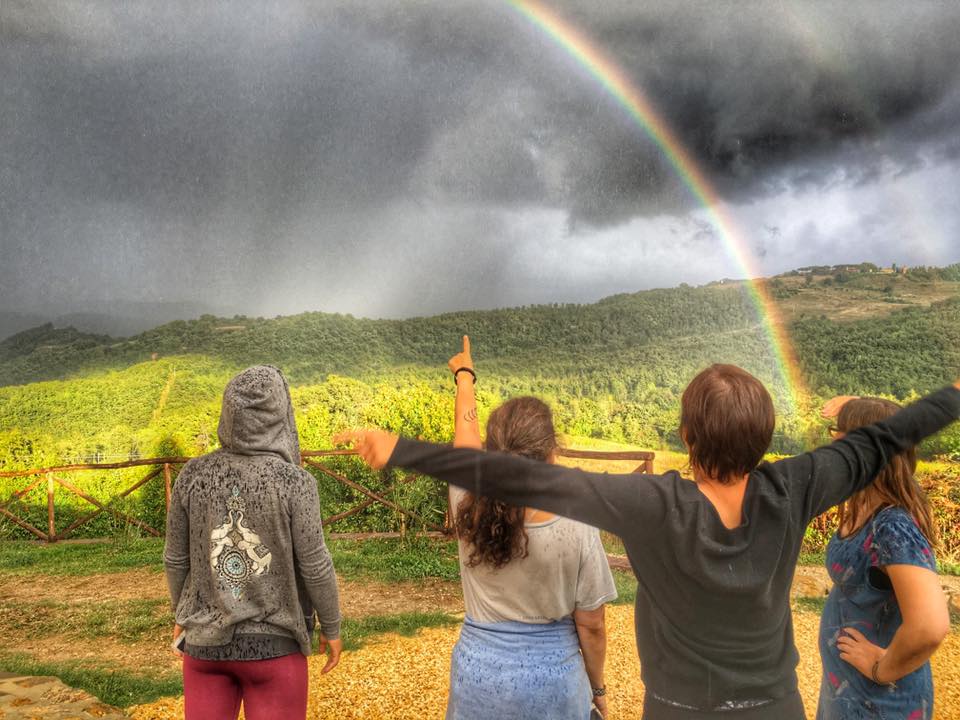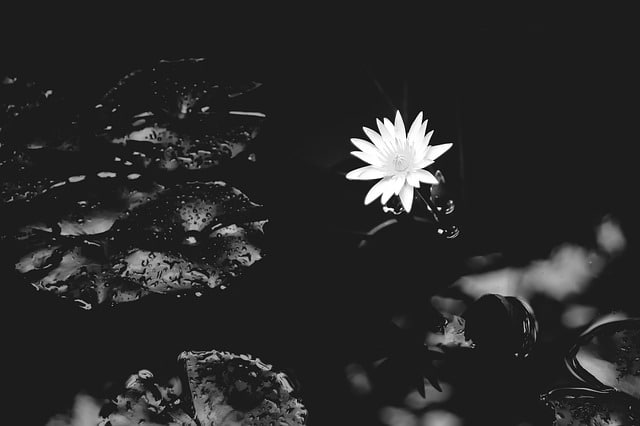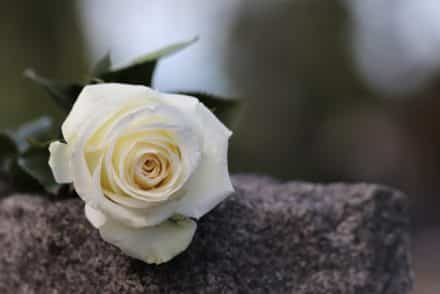CW: This essay discusses miscarriage.
By Hanna Bartels
It started with red and it ended with water. And in between, I waited at the Starbucks counter and I rested my fingertips on the contour of the beginning. A habit, a protective hand. But the baby beneath that barely there bump stopped growing the day before. My baby was now just my pregnancy and the next day would be just blood and tissue.
I rubbed my thumb against an angel pinned to an impossibly small blanket in my pocket. Over a bead of blistered plastic at the bottom of the left wing where the mold opened too soon and hot resin seeped out.
When someone you know dies, you mourn the loss of them. Their smell, the sound of their voice, how your days transform without them. But when you lose a pregnancy, your life doesn’t change at all. Your belly should swell, your house should fill with bouncers and swings and carriers and bottles and dirty diapers. But instead, you drink your coffee and the world spins on its axis.
The warped angel was a reminder: I was pregnant once, and now I am not.
***
Four days before, I’d noticed a spot of red on my toilet paper.
I rummaged through my medical file, searching for the number the nurse had first starred and then circled at my first prenatal appointment.
My mother-in-law called down the hall, good morning and cheerful, asked if she should make coffee. She was in town for a cousin’s wedding and my husband, a surgical resident, was at the hospital.
Just one second, I told her, I’ll make it.
I pushed aside flour and sugar in my cabinet to reach the coffee I hadn’t touched in months.
I just had some spotting, I told her as I scooped ground beans into the filter.
That’s common in the first trimester, she told me. Told me she knew another woman who had spotting, too. Told me not to worry.
Still, I said, I think I’ll call the nurse line. Mumble something about being a terrible host, leave her alone with the hum and weep of the coffee machine.
I dialed and waited. I told the nurse my symptoms. No cramping, no pain, no light-headedness, just a few spots of blood. The nurse told me this was common. She told me not to worry. Take it easy. Call us if anything changes.
I hung up and sat on the edge of my bathtub, fingers wrenched around the polished spout.
I’d started feeling better a week before. I wasn’t nauseous anymore. My doctor told me I was one of the lucky ones. My body had just adjusted to the hormones. Everything was normal, my baby was normal and I didn’t need to worry.
Like a funhouse floor, I’d started to tip away from where everyone was standing. I texted my husband. Told him the blood was small but bright red. He told me spotting is normal. The same reassurance. Normal, normal, normal. Told me not to worry. Told me he would be home soon.
At the wedding that night, I asked for a glass of red wine with dinner and when the cousins were absorbed in conversation, I switched it with my husband’s empty glass. Our little secret, a little game.
You’re pregnant! A cousin whispered. You haven’t touched that wine!
The cousins hugged us, told us parenthood is the best thing they’ve ever done, told us they love watching dance and pee-wee football, told us they can’t take enough pictures, told us we would be the best parents.
We glowed because it felt so good to tell our little secret. We danced to “Paradise by the Dashboard Light” and I drove my drunk husband home as he told me how amazing it was that our baby was growing inside of me, told me he loved me, told me he was so excited again and again and again. The spotting was gone. We felt safe and anchored to the earth. And our baby inside me slouched toward its final heartbeat.
***
On November 1st, I woke up at 4am while my husband was getting ready to leave for the hospital. The spotting that everyone had insisted was normal had turned to bleeding overnight.
This isn’t normal, I yelled from the next room. It’s too much, I said when he got out of the shower.
Just call the nurse line again, he said, his fingers brushed my shoulder.
He left and I lay in bed watching the ceiling fan in orbit, its shadows spilling across the wide windows, waiting for 7am when I could call the clinic. At 7:01, I dialed. I told the nurse I woke up to bleeding. How much? She asked. I told her and she was quiet for a moment. Cramping? She asked, and I told her just a little, more like pressure. I downplayed my symptoms, as if by not acknowledging them they would cease to exist. She referred me to the obstetrics triage at the hospital downtown. Told me to go within the hour.
I showered before I left and scrubbed the smear of blood on my inner thigh.
A nurse was waiting for me at the obstetrics triage desk. She led me to a hospital room, handed me a gown and stood in the room while I changed into it. I hesitated before taking off my pants.
Is there a pad? I just don’t want to make a mess, I mumbled.
Oh honey, it’s fine, she told me and put down a blanket.
I suppose you see this all the time, I started to say, but stopped, rethinking it.
She took my vitals, told me my blood pressure was higher than usual, but that was to be expected given what I was going through.
I realized, then, that she knew and I knew how this would end.
She left and a resident came in to explain how the exam would go. She spoke softly, carefully as she pulled the ultrasound machine next to the bed. Would you like to see the screen?
No, I said, immediately.
She began moving the wand around. I watched her face, waiting for some sign of relief, some flicker of assurance. She was silent, not a twitch, nothing. Finally, she said I do see a pregnancy, and I felt hope rising like a balloon in my throat. But I should have known, pregnancy does not mean baby. The subtle power of a word, the unmaking.
I don’t see a heartbeat, she continued. And the fetus doesn’t look like we would expect. She told me she was going to take a few measurements.
I was silent.
Eventually, I asked if I could see it.
She tilted the screen toward me and pointed out my baby. On the screen, it looked so big, so unbroken. A real baby in a black ocean, growing inside of me. Or rather, suspended in time.
She told me it stopped growing the day before, that it had a small cyst on the chest, that this, the end, was inevitable. She stopped to look at my face. Is this too much information? She asked, gently.
No, I said. This is helpful.
This is just a random defect. A failure of mitosis, she told me. It happens in sixty percent of all miscarriages.
A millimeter of resin, seeping through the perfect, plastic baby mold.
When she left the room, I texted my husband the facts: The baby doesn’t have a heartbeat. There’s a chromosomal abnormality. Ordering a second ultrasound to be sure.
The nurse returned and helped me into a wheelchair to wheel me down the hall.
Can I call your husband? Is he working? I’d hate for you to be alone.
I told her he was working. That I was okay.
I didn’t tell her that he was in that same hospital. Somewhere, in an operating room where he was more useful than he would have been here. He just needed the facts. The diagnosis.
At the second ultrasound, they confirmed what I already knew. No heartbeat, abnormalities, no viability. A pregnancy, a fetus, but not a baby.
The ultrasound technician placed a picture in my lap, retreated back into the dark. I ran my fingers over the baby in the picture, a staticky view of a life. That little something, the proof that for a handful of weeks I was never alone.
When I was wheeled back into my hospital room, the nurse handed me a packet of information. A pamphlet about miscarriage, a brochure with grief support groups in town, a small blanket with pink and blue hearts stitched gingerly along the edge, a gold angel pinned to a white ribbon in the center of the blanket.
I winced, barely.
The nurse started to tuck the blanket into the pocket of her scrubs, then stopped. Do you want this? She asked, a double-check.
I told her I thought I’d want it eventually. And I would. I would fall asleep on my couch in the coming days, the blanket clenched in my fist.
The nurse sat next to me on the hospital bed.
I’m so sorry this happened to you, she said and I nodded.
I’m okay, I murmured.
I was pregnant and now I am not. This adjustment. It reached around and through me, suffocating, a petroleum slick in coastal waters.
I was discharged. My body had already begun to expel the contents of my uterus, the resident told me, so there was no need for further medical care. Those words again. Baby, fetus, pregnancy, tissue, blood, nothing. The slow progression toward empty.
I texted my husband once more: The nurses were all very nice. Headed home now.
***
When my husband came home, we held each other in our entryway, we didn’t speak. Later, we ate leftover Halloween candy; we looked at the static, a milky bubble in a nebula of black, lightly touching the edges so as not to smudge the image. We watched the Chicago Cubs win Game Six of the World Series and my husband kept his hand on my knee, his fingertips pressed against my skin, anchored to him so I couldn’t float away.
As I lay in bed, I felt a sharp barb in my abdomen. My husband slept next to me so I slipped down the stairs to the bathroom. There was a primal, visceral physiology to it all, the contractions. The acute ache and spasm, heavy waves and transient quiet, the hemorrhaging. The understanding that I was giving birth to something that resembled nothing at all but that, somehow, I knew I could identify. I thought, for a moment, about waking my husband to hold my hand while I labored. To be there for the birth of nothing.
Finally, a splash, and I knew without looking that the contents of my uterus, the gestational sac, my baby, was sinking to the bottom of my toilet bowl. Without thinking I plunged my arm into the bowl, I cupped the sac in my hand, let out a sound, a gurgle or a strangled wail, then dropped it back into the depths of the toilet. I sank to the floor, my bloodied arm propped against the seat. I wanted to see my baby inside the sac. I wondered what it would look like. If I could see its little fingers, if I could see the cyst that had killed it, its eyes with the eyelids still fused shut against its transparent, papery skin. I thought about scooping it back out again and burying it at the tree line of our yard, alone, at midnight. A little memorial service only for me.
So for a moment, my baby slept at the bottom of my toilet bowl while I decided if I could stomach flushing it down like the beta fish I bought in a moment of spontaneity in college. I noted the time, 11:58pm, like it was somehow important, although I knew my baby had already been gone for days. This was nothing at all. Blood and tissue and water.
I flushed.
There was a small red stain on the white porcelain. I would scrub it out the next morning.
***
In a moment of levity over the next few days, I told my mother that miscarriage is bullshit. You go through the worst parts of pregnancy, the nausea, the exhaustion, and then the pain of labor with no baby to hold at the end of it all. I laughed. What an elaborate prank the universe had played.
That I never knew my baby, its voice or its smell, didn’t seem to matter. I felt the void of its absence more absolutely than I ever could have imagined. A phantom limb, perennial and transcendent of all notion of knowing.
I started mentioning my loss in conversation, a kind of knee-jerk reaction to the mention of motherhood. Oh, yes, I was pregnant too, but now I am not.
The silence was cavernous. The sharp intake of breath, the eyes shift to the floor, the fidget, the sputtering cough, the gentle turn of conversation. I need the recipe for these cookies! The quiet discounting of an experience. The premature loss of a life that mattered so little that I should stay silent about its existence.
It is for the best! They say, those that do respond.
You can always try again!
At least you know you can get pregnant!
These empty assurances, the relief on their faces when I smile, when I nod. This, too, like all of the broken dinner plates tossed into the garbage over the course of my lifetime, is replaceable.
In the months after, I saw picture after picture of chubby newborn, swollen baby bump. I heard joyful announcements of pregnancy and birth. And then, complaints about how uncomfortable pregnancy can be: the nausea, the heartburn, the future soccer star that won’t stop kicking at ribs. How awful. And a laugh. A private joke.
I can’t even imagine, I’d started saying instead, deliberately compartmentalizing this scrap of my identity. Because I knew better than to tell them, the mothers, that for a time, I was a part of their club. That I was lucky enough to host a life that briefly touched our world with a rush of euphoria before moving on into eternity.
And then, on a trip to Japan, I learned that Japanese Buddhism embraces a tradition of memorializing babies lost to miscarriage. Mizuko Kuyō, a memorial service to comfort the soul of the lost baby, mend the hearts of the grieving parents, an offering to the protector of children. Mizuko, meaning “water child,” a baby that lived for too short a time, a little infinity in the water of a woman’s womb. A word, a ritual for something lost.
And for me, speaking about this unspeakable thing, this story of simultaneous birth and loss, felt like a memorial service. The cauterizing of a great wound. Honoring the little life that made me a mother, too.
I was pregnant once and now I am not.
***
Just one day after my miscarriage, almost to the minute, my husband and I lay in bed watching our Chicago Cubs scramble through the rain in the tenth inning of the seventh game of the World Series. We watched Anthony Rizzo make the game-winning catch, thrusting the Cubs out of a 108-year drought. My husband took my hand. Since the moment our baby’s heart stopped beating inside of me, the Cubs had won every game of the series, battling back from a 3-1 game deficit to win the whole thing.
I think our baby likes the Cubs, I told him, although I knew from the way his fingers wrapped around my palm like he would never let me go that I didn’t have to.
The beauty of pregnancy, then, lies in the fact that the mother and the father become party to creation. Cultivating a life, fervently, fiercely loving it as the universe weaves it into being. We created something together. A little infinity in the water that slid out of me that November midnight and left me suddenly alone. And after it was gone, we were still there, holding each other together so we couldn’t float away.
Hanna Bartels received her BA in Creative Writing from Northwestern University. She lives in Rochester, Minnesota with her husband and two crazy dogs. After a brief hiatus from writing while she attempted to navigate the real world, she has recently returned to doing what she loves (and has never been happier). We are honored to be the first to publish her work.

Join The Manifestation Retreat: Manifesting Under The Tuscan Sun. June 17-24. Email retreats@jenniferpastiloff.com or click the picture above.

Join Jen Pastiloff at her signature workshop in Atlanta at Form Yoga on Aug 26 by clicking the picture.






3 Comments
Wow. The beauty of love. The heartbreak of loss.
This is so beautiful. Thank you.
I hope you keep writing.